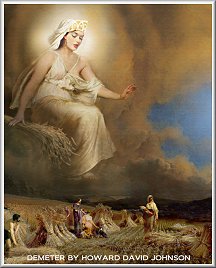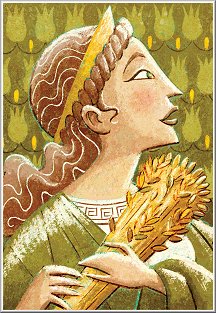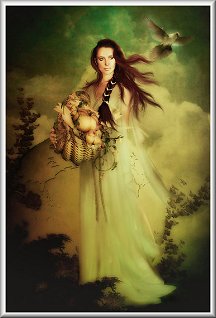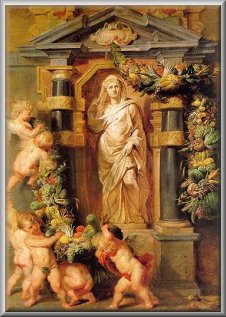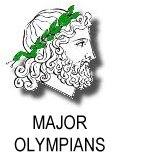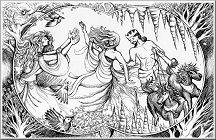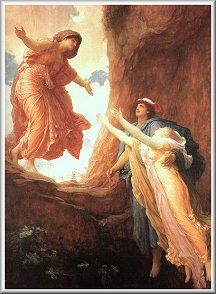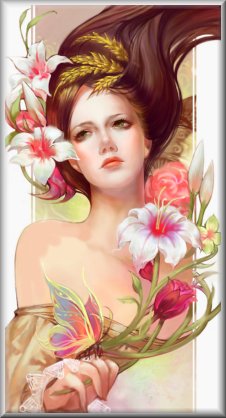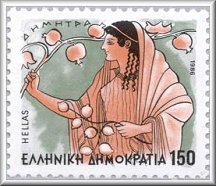MYTH MAN'S AWARD-WINNING HOMEWORK HELP
DEMETER, GODDESS OF THE HARVEST
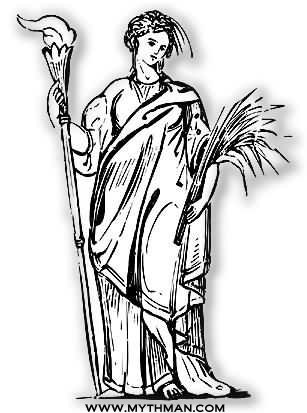
LATIN - CERES

Demeter was the goddess of Corn and therefore also of the
Harvest, and her cult particularly flourished in the regions where grain was
grown: in the region of Eleusis, in the Peloponnesus, in Crete, in Thrace and in
Sicily. She was the first to gather the corn, prepare and preserve it, and to
instruct mankind how to sow it.
Demeter's cult titles include Sito (wheat), because she is the
bringer of food, grain or corn, and Thesmophoros,
which loosely
translates as Bearer of Divine Order/Unwritten Law, because of
the civilizing aspect of agriculture. She is also known as the
Corn Mother, Chloe (green shoot), Cthonia (in the ground) and
Anesidora (sending up gifts from the earth.)
She is usually portrayed as serious and dignified,
dressed plainly in a long robe. Her nurse was Eirene (Peace). The
beloved goddess of the harvest also brought to humans the cultivation of
grain (wheat and barley) which, according to one legend, allowed them to
stand upright.
Also known as the goddess of fertility, Demeter was
the daughter of the Titans Cronus and Rhea and thus Zeus’ sister. Her
other Olympian siblings included Hades, Poseidon, Hestia and Hera.
Demeter was often portrayed on a chariot amid harvest images, including
grain, fruit and flowers. Her daughter Persephone was regularly pictured
with her in ancient depictions.
Even though she is most often associated as the Harvest goddess, Demeter
also presided over Marriage, the Cycle of Life and Death,
and the ancient Sacred Laws, which are the moral and ethical
codes taught by religious traditions.
Along with Dionysus (known in Roman as Bacchus, god
of Wine) Demeter was one of the two most important gods in the everyday lives
of people. While many other gods did little to help mortal people unless
it suited their needs, these two were truly mankind’s best friends.
What also made them very different from other gods,
was that they were the only two to have known and felt suffering and
true grief, while the other gods for the most part lived happy and
blissful lives, feasting on nectar and ambrosia up on lofty Mount
Olympus.
Demeter’s tragic story is her search for Persephone (Kore),
Demeter’s only child from her union with Zeus, the King of the
Olympians. Persephone grew up happy, playing with Artemis and Athena,
the other children of Zeus, but one day her uncle, Hades, fell
desperately in love with her.
One day, while she was picking flowers in a meadow
along with her girlfriends, the earth opened wide and Hades appeared,
riding an awesome chariot that was pulled by four black horses.
Persephone was abducted by Hades and dragged down to the Underworld with
him.
Hearing her daughter's screams, Demeter rushed to her
aid but wasn't able to find her. She had disappeared under the earth,
but her mother didn't know this. Heartbroken, Demeter searched the
entire earth without stopping to eat, drink or take care of herself.
Disillusioned once she
discovered the identity of the abductor she decided to leave Olympus and
renounce her divine duties until Persephone was returned to her.
Demeter's self-imposed exile caused the earth to go
barren and Zeus, who was responsible for maintaining order in the world,
finally commanded his brother Hades to give back Persephone. Because she
had eaten seven seeds from a pomegranate while in the Underworld,
however, Persephone was bound to remain there.
An arrangement was eventually worked out and
Demeter's daughter later returned to earth with the condition that she
spends four months of each year with Hades. In these months Demeter
misses her daughter so much that she withdraws her gifts from the earth,
and winter comes. But when her daughter returns, Demeter is so happy
that she restores all her gifts and spring starts.
The epic poet Homer claims that the goddess Hecate was
an assistant to Demeter while she searched for her daughter and
afterwards she became Persephone's attendant in the Underworld.
During the search for her daughter Demeter
had visited the city of Eleusis and taken a job as a nurse to a royal
family. She took care of the infant, a mortal named Triptolemus, using
her powers in an attempt to make the boy immortal. When he grew older
Demeter gave Triptolemus a chariot of winged Dragons and bushels of
wheat with which, flying through the sky, he sowed the whole inhabited
earth.
She was known as a kind goddess and
not usually vindictive, but to punish the Sirens for not coming to the
assistance of her daughter when she was being kidnapped, Demeter
transformed them into flying creatures, the scourge of ancient sailors.
Another time, while looking for her daughter,
Demeter came to the region of Attica. She was very thirsty, for she had
been traveling far and wide, and was relieved to see a spring with cool
clear water. As she thirstily lapped the refreshing water, she was
startled to hear a man named Ascalabus, laughing at her because of
her way of drinking. Embarrassed at this, distraught at the loss of her
daughter, and angry at Ascalabus for being so rude, Demeter turned
him into a gecko, which is a small insect-eating lizard.
There was another instance where
the goddess proved to be cruel: A mortal named Erysichthon cut down an
oak tree sacred to Demeter. In order to punish this profane act, the
goddess sent endless famine to the poor man. As much as Erysichthon ate,
so much he desired again. There was no satisfying him, and he ate
constantly until at the end he ate himself and died.
Either to test Zeus' ability to know all, or
simply to show what a good host he was, a man named Tantalus slaughtered
his own son, Pelops, cut him up, boiled the pieces and offered them as a
meal at a feast of the gods. Of all the gods only Demeter unknowingly
ate his arm, but when this outrage was discovered he was given life
again by the will of the gods. His limbs were joined together but the
shoulder was not complete, so Demeter fitted an ivory one in its place.
THE ELEUSIAN MYSTERIES
The Eleusian Mysteries was one of Greece’s most
important and intriguing festivals. It was associated with Demeter and
in fact held in her honor. "I
am Demeter, revered by all, the power most useful for gods and men," she
said, making herself known to the people of Eleusis. To honor her they
raised a temple and thus were born the Eleusian Mysteries.
The Mysteries gave the initiates higher hope for this life and for the
afterlife. They are
connected to Demeter's journey to the Underworld to retrieve her
daughter Persephone. This celebration of harvest was held every five
years for nine days in September-October.
We know very little about the Mysteries, as all
participants were sworn to secrecy. The candidates for initiation
purified themselves in the sea and then the procession followed the
sacred path from Athens to Eleusis, arriving at the sanctuary by
nightfall. There, they spoke these words:
"I have fasted, I have drunk kykeon,
I have completed my tasks
and put the objects in the wicker basket
and the rush basket."
(Clement of Alexandria, Prokeptic, II,
21)
(Kykeon was barley water flavored with mint, and it
was the first nourishment that Demeter had prepared for herself when she
broke her fast following her daughter's loss.)
The spoken words were followed by secret rites
carried out in silence, completing the first part of the initiation.
Here is a nice description from The
Wordsworth Dictionary of Mythology:
"The 'mysteries' are so called because their
secrets have been very well guarded. Was the symbolic task the search
for a rudimentary mill for grinding corn - seen as a step in the
progress of civilization - or, indeed, the performance of sexual acts?
It is still not known.
The second phase of the initiation was a spiritual
experience. The ancient philosopher Aristotle expressed it clearly:
'The initiates were not meant to learn anything,
but rather, to experience certain emotions and moods.' (Fragment 15; ed.
Rose)
Finally, as Demeter again took her place among the
immortals, the initiates returned to Athens and to the life they had
left for a short time. The Eleusian Mysteries were only an interlude in
the life of the city, an interlude where men, women and slaves found
themselves awarded the same status, devotees of a single cult, following
the same path. It was a brief and controlled hiatus in the political
life of the country.
The Romans gave Demeter the name of Ceres, an ancient
divinity of the fertile earth. Demeter's symbol is the poppy, a bright
crimson flower that grows well among the barley.


[HOME] [MYTHOLOGY'S
EFFECTS ON MODERN SOCIETY][OLYMPIANS]
[GALLERY] [MAJOR
GODS] [MINOR
GODS] [HEROES]
[CONTACT]
[LOVE STORIES]
[MYTH OF THE
MONTH] [FUN
STUFF] [CREATURES]
Web, myth narration and graphics created and
maintained by Nick Pontikis
Copyright © 1995 Nick Pontikis
Thanasi's Olympus Greek
Restaurant
Copyright 1999
mythman.com
greekmythologytoday.com
mythmaniacs.com
The Myth Man persona copyright 1988 Nick Pontikis
